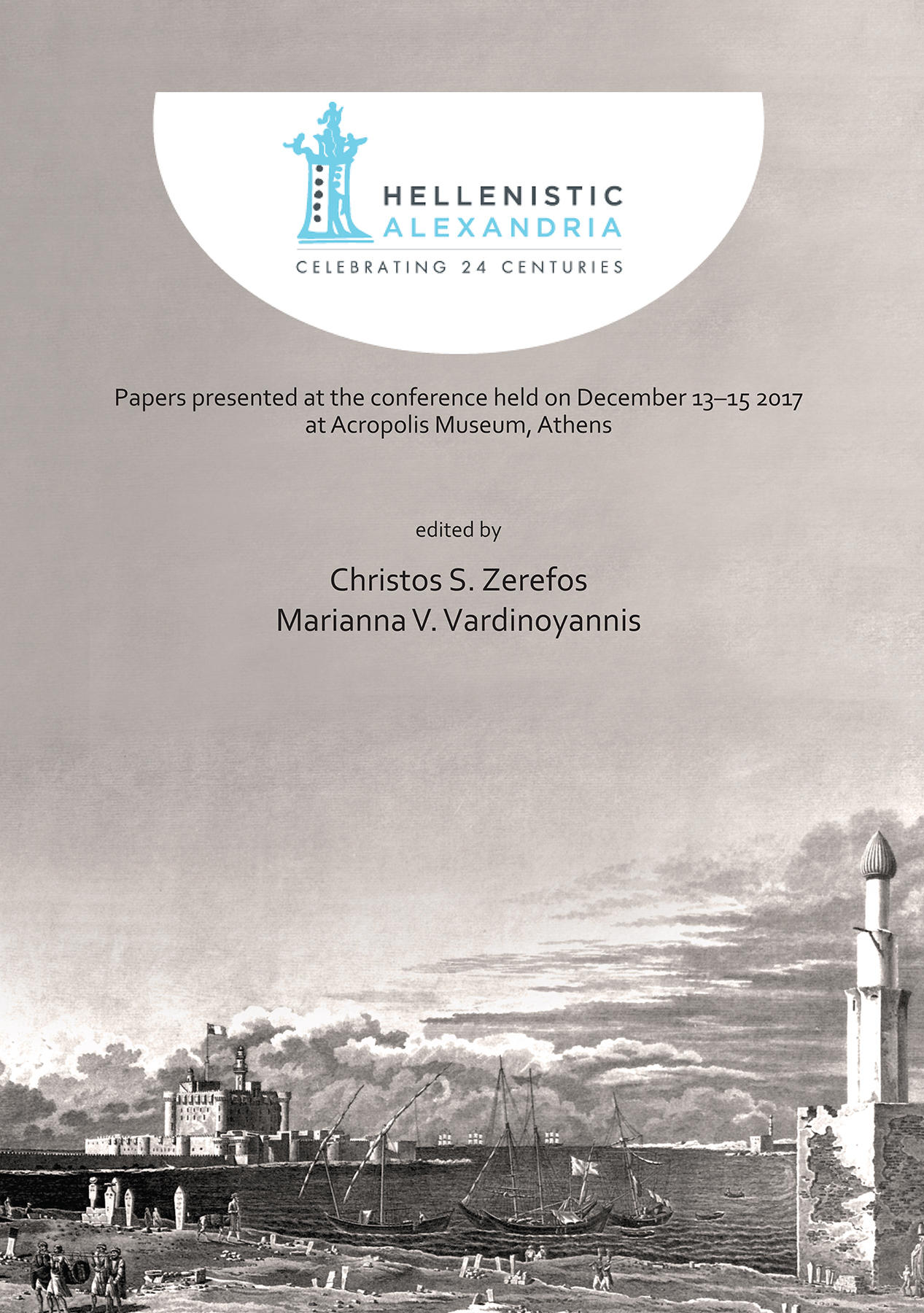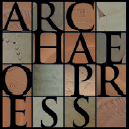
Publishing Scholarly Archaeology since 1997

Download Sample PDF
H 290 x W 205 mm
322 pages
Illustrated throughout in colour and black & white (56 plates in colour).
Published Feb 2019
ISBN
Hardback: 9781789690668
Paperback: 9781789690668
Digital: 9781789690675
Keywords
Alexandria; Hellenistic; archaeology; history; philosophy; literature; art; culture; law; medicine; technology; environment
Hellenistic Alexandria: Celebrating 24 Centuries – Papers presented at the conference held on December 13–15 2017 at Acropolis Museum, Athens
Edited by Christos S. Zerefos, Marianna V. Vardinoyannis
This proceedings volume includes high-level dialogues and philosophical discussions between international experts on Hellenistic Alexandria. The goal was to celebrate the 24 centuries which have elapsed since its foundation and the beginning of the Library and the Museum of Alexandria.
Contents
Opening of Hellenistic Alexandria Conference
Part 1: Archaeology, History, Philosophy, Literature, Art, Cultural Heritage and Legal Issues
New data concerning the foundation of Alexandria – by Jean-Yves Empereur
The navy of Ptolemaic Alexandria – by Emad Khalil
Twenty years of underwater archaeological and geophysical surveys in Alexandria by the Greek Mission (1998-2017) – by Harry E. Tzalas
Macedonian elements in Alexandria – by Angeliki Kottaridi
The early Greek presence in Alexandria – by M. Abd El–Maksoud, A. Abd El–Fattah and M. Seif El–Din
Italian archaeology in Alexandria – by Mohamed Kenawi and Giorgia Marchiori
‘Crumbs from the Table’— archaeological remains of Hellenistic Alexandria – by Grzegorz Majcherek
Believing in afterlife in Hellenistic and Roman Alexandria. A study of some funerary paintings – by Anne-Marie Guimier-Sorbets
Graeco-Egyptian elements in Alexandrian architectural mouldings – by Mona Haggag
Alexandria in the ‘Corpus of Ptolemaic inscriptions’ – by Kyriakos Savvopoulos
From Macedonia to Ptolemaic Alexandria: the cult of Dionysos Pseudanor – by Emmanuel Voutiras
Hellenistic drama and Alexandrian culture – by Georgia Xanthaki-Karamanou
The Alexandrian cradle of philological science – by Theodore D. Papanghelis
Egyptian and Egyptiote literature as a bridge between two cultures – by Shaker Moussa
From Alexandria to Venice: Remembrances of Alexandria in the cultural treasures of Venice – by Chryssa Maltezou
The destruction of libraries in the course of history and the international law on the protection of cultural property in the event of armed conflict – by Artemis Papathanassiou
Is the possession of the Parthenon Marbles lawful according to the contemporary English law? – by Christos Mylonopoulos
Part 2: Science, Medicine, Technology and Environment
A very brief introduction to Hellenistic Alexandrian technology – by T. P. Tassios
Royal catasterisms: Arsinoe II and Berenice II translated to the stars – by Dee Clayman
Antikythera Mechanism as evidence for Hellenistic technology excellence – by Xenophon Moussas
Gigantic and structurally sound: the lighthouse on the island of Pharos and the minarets of western Islam – by Paolo Vitti
Philon’s automatic servant. A reconstruction with a description of S. Economopoulos’ air-valve mechanism – by Manolis Korres
The Hellenistic mathematician Archimedes and his Renaissance admirer Kepler – by Eberhard Knobloch
Ancient Greek optical instruments and the Pharos of Alexandria: insights on its functions and technology – by Moussas, Vitti and Zerefos
Space – Time – Matter – Motion: John Philoponus: a prelude to Galileo, Descartes and Newton – by Emmanuel Floratos
Hellenistic medicine and the Library of Alexandria: its influence in the west and the east – by George P. Chrousos
Palaeoclimatic conditions during the Hellenistic period in the Eastern Mediterranean – by J. Luterbacher and E. Xoplaki
A tentative methodology of sea-level change based on fish tanks from Hellenistic Alexandria, vis-a-vis, the submerged el Hassan rock provide a new look for subsidence estimates – by N. Evelpidou, C. Repapis, H. Tzalas and C.
About the Author
Christos Zerefos is Head of Research Centre for Atmospheric Physics and Climatology, Academy of Athens and president-elect of the General Assembly of the Hellenic Foundation for Research and Innovation; Professor of Atmospheric and Environmental Physics at the Universities of Athens and Thessaloniki; Visiting Professor, Universities of Minnesota and Boston; Samarbeidspartnere (Scientific Collaborator), University of Oslo. He is known for his research into ozone, UV, ozone-climate interactions and climate-extreme events. He is member of the Academy of Athens, Academia Europaea, Norwegian Academy of Sciences and Letters, European Academy of Sciences, Russian Academy of Natural Sciences and other distinguished scientific societies. He is recipient of the UNEP Global Ozone Award, 1997 and of a number of distinctions, awards and medals from WMO/UNEP, and various scientific societies (e.g. Blaise Pascal Medal, European Academy of Sciences; AGU Kaufman Award; European and Balkan Physics Societies’ Award; European Union Prize for Cultural Heritage-Europa Nostra Award, and others). He received the Award Certificate and Letter from UNEP and IPCC for substantial contribution to the reports of IPCC, which shared the 2007 Nobel Peace Prize with the former Vice President of USA, Al Gore (December 2007). He is honorary professor, Physics Department, Aristotle University of Thessaloniki; has an honorary doctoral degree from the Physics Department, University of Patras; honorary degree of Doctor of Humane Letters, university division of the American College ANATOLIA, Thessaloniki. He has supervised 50 MSc and 30 PhD degrees and has originated eight international research centres. His research work in peer-reviewed scientific journals is acknowledged widely by the scientific community. (For more see www.christoszerefos.com/)
Marianna V. Vardinoyannis is a Goodwill Ambassador of UNESCO for the protection of children, founder and president of the ‘Marianna V. Vardinoyannis Foundation’, of the ‘ELPIDA Friends’ Association of Children with cancer’ and of the ‘Orama Elpidas Association’. She has built up an extensive record of humanitarian work for the benefit of children and disadvantaged social groups in Greece and abroad, as well as on issues of peace, human rights, education, health, cultural heritage and dialogue among civilizations. She serves as member of the Advisory Board of the Bibliotheca Alexandrina and she founded and funds the Alexandria Center for Hellenistic Studies. She also serves as trustee of the MENTOR Foundation against drugs and of the ‘Nizami Ganjavi International Center’, as member of the Leadership Council of the ‘Robert F. Kennedy Human Rights’, as founding member of the ‘Light of Africa Foundation’, as president of the Honorary Committee of the Special Olympics Hellas, and member of many other organizations. Dr Vardinoyannis holds BA in History of Art and in Economics, MPhil in Archaeology as well as honorary doctorates in Law, Philosophy and Human Studies. She has received numerous distinctions: Officer of the Legion d’Honneur of the French Republic (2015), Chevalier of the Legion d’Honneur (2006), ‘Mother Teresa Medal’ of the Albanian Republic (2015), ‘Golden Cross of the Order of Benefaction’ of the Hellenic Republic (2002), Office of the Great Lady of the Patriarchal Throne of St Mark (Patriarchate of Alexandria, 2008), ‘Ripple of Hope’ Award of the ‘Robert F. Kennedy Human Rights’ (2015), Grand Prix de la Charte de Paris contre le cancer-AVEC (2014), Athens Academy Award (2017 and 1997) and many others.

 Add to wishlist
Add to wishlist
